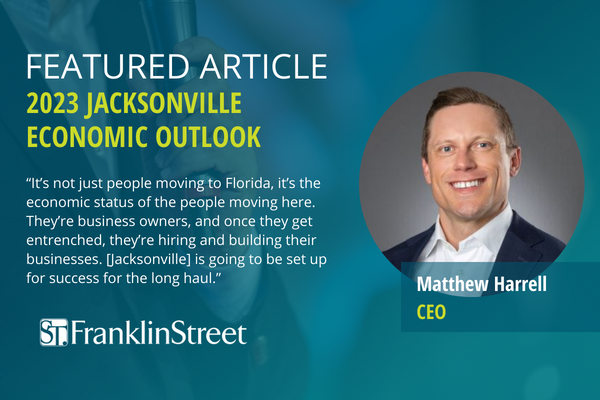Franklin Street was pleased to serve as a presenting sponsor of the Jacksonville Business Journal’s 2023 Economic Outlook Event! Below are excerpts from JBJ’s recap of the event, featuring key highlights from Franklin Street CEO Matthew Harrell’s presentation.
When navigating the current economic forecast, it’s not unreasonable that analogies to weather conditions arise. Whether turbulent times, choppy waters or even how the markets may be head “into the storm,” predicting the markets can be like predicting the weather.
These were the phrases heard amid the lessons shared at a recent Economic Outlook panel discussion. Held at the studios of WJCT Public Media and hosted by Franklin Street and Fifth Third Bank in partnership with the Jacksonville Business Journal, economic experts reviewed market conditions from before and through the pandemic, and what they anticipate for the year ahead.
…
CRE PLAYERS OPTIMISTIC FOR FUTURE
Those in the commercial real estate sector are optimistic, said Carrie Smith, Senior VP of Retail Leasing and Tenant Services with Franklin Street. Yet they acknowledge the economy faces choppy waters ahead.
Just look at interest rates. To be sure, interest rates around 5% pale compared to 10% or 15% from decades ago. Unsettling is how fast rates rose going from .25 to 4% in less than a year, said Matthew Harrell, CEO of Franklin Street.
“If you’re a commercial real estate owner going from a 1% to a 2% interest rate is like a 50% decrease in value, unlike going from a 10% to 11% is a 10% decrease. This is not giving the market the opportunity to catch up with the philosophy of the [Fed],” he said. “This is massive. This is making an impact. We’re going to see the impact on commercial real estate for several years.”
The negative yield curve has led to uncertainty in the market. In the commercial real estate sector, which relies on debt, debt service becomes an issue. Lenders who change their required debt service coverage ration upon refinancing will leave borrowers struggling to meet the new levels. They may be forced to pay the bank millions to pay down the loans and increase their equity, or raise net operating income, or sell the property.
For new buyers seeking to improve their capitalization rates, rising interest rates will drive loan constants to unreasonable levels. “If you’re an investor, are you going to accept a lower return,” Harrell asked. “No, you’d put it into a treasury [bond].”
Harrell called this moment a “slack tide period.” Buyers will demand lower purchasing prices to get the returns they seek, forcing sellers to make hard decisions.
JACKSONVILLE POISED TO WEATHER STORM
In the greater market, inflation, which now is at a 40-year high, could pose a problem, Harrell suspected. Consumer sentiment is at a 40-year low and personal savings are dropping. Inflation is hitting Florida harder than other areas. He believes it won’t abate any time soon.
“Savings are at an all-time low, their paycheck can afford less, and consumer credit through the roof,” he said. We’re at this tipping point. We’re in the storm.”
There are opportunities to be found. To wit, the company experienced record growth across all its business lines. As President Franklin D. Roosevelt once said, “a smooth sea never made a skilled sailor,” Harrell told the audience.
Commercial property owners have seen record rent growth, especially in Jacksonville and along the Interstate 4 corridor stretching from Tampa through Orlando, which has seen record population growth. Pre-pandemic, Jacksonville was among the fasted growing MSAs in the state. People are relocating from other markets across the state, like Miami, in search of affordability and convenience. They’re finding it in St/ John’s, Clay and Nassau counties.
“Jacksonville has all those checked boxes,” he said.
While New York, New Jersey, Illinois and California are losing residents and employers, what they’re really losing is top earners, he said. The “wealth migration” coming to Florida is bringing those top income earners with at least four times the income of the average earner. It has amounted to $25 billion in additional wealth arriving here, he said.
“It’s not just people moving to Florida, it’s the economic status of the people moving here,” he said. “They’re business owners. Once they get entrenched, they’re hiring and building their businesses. We’re going to be set up for success for the long haul.”





